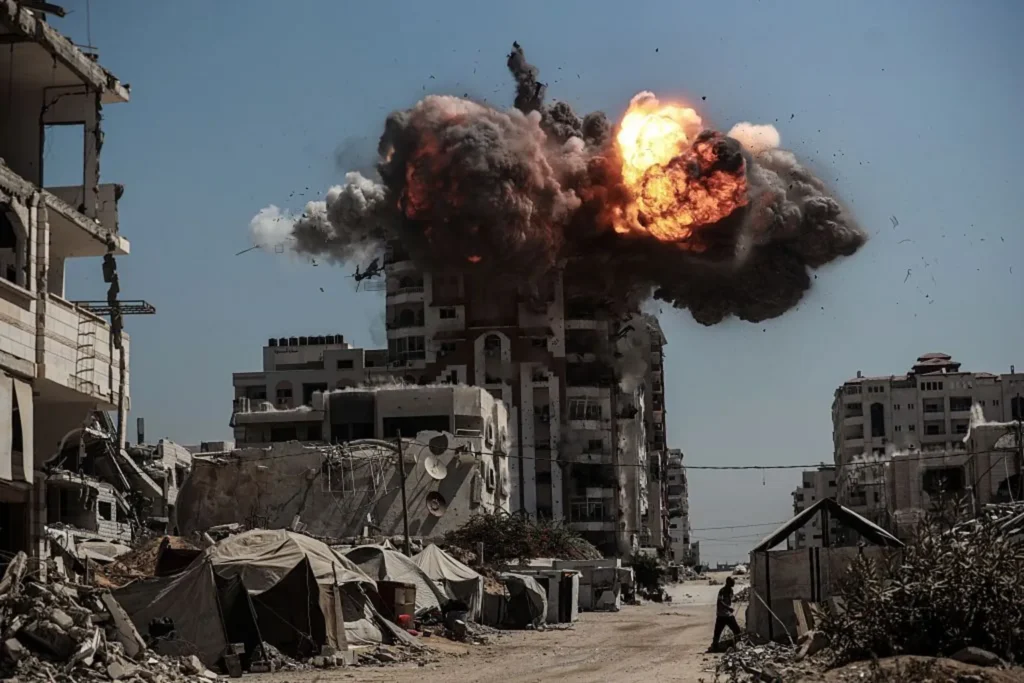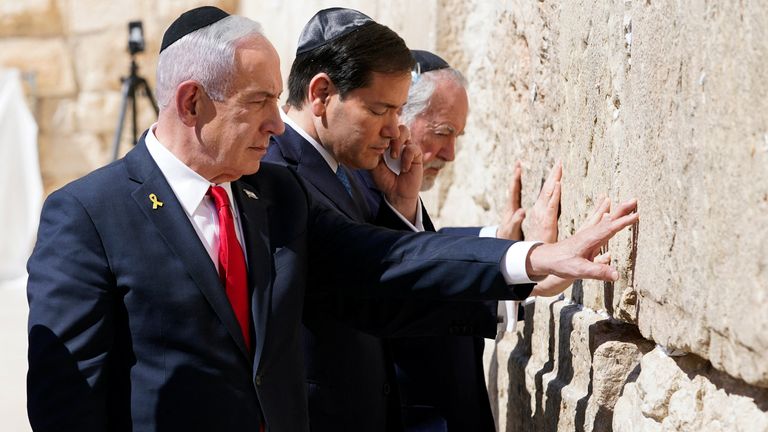Israeli Prime Minister Benjamin Netanyahu has indicated that Israel may continue to target Hamas leaders beyond its borders, following a controversial strike in Qatar last week that triggered global backlash. Speaking alongside US Secretary of State Marco Rubio in Jerusalem, Netanyahu said that Hamas figures would not enjoy immunity “wherever they are,” defending Israel’s right “to defend itself beyond its borders.”
The comments underscore a growing tension between Israel, its allies, and the wider international community, as the conflict in Gaza intensifies and questions of sovereignty and international law take center stage.
A Controversial Strike in Qatar
Last week’s Israeli attack in Doha marked a dramatic escalation. The strike, which Hamas claims killed six people though not its senior leaders, targeted the group’s political bureau — long hosted by Qatar, a close US ally.
The move stunned regional observers and drew sharp criticism from world leaders. Even US President Donald Trump, generally a staunch supporter of Israel, publicly rebuked the action and assured Qatari leaders that such an incident “will not happen again on their soil.”
Pressed by reporters about possible US involvement, Netanyahu was blunt: “We did it on our own. Period.”
Diplomatic Balancing with the US
Despite the tensions, Netanyahu and Rubio presented a united front during their press conference. Rubio emphasized the strength of US-Israel ties, describing them as deeply rooted in “technological and cultural cooperation.” Netanyahu, for his part, declared that Israel has “no better ally” than the United States.
Their partnership was symbolically reinforced when the two visited the Western Wall in Jerusalem, accompanied by US Ambassador Mike Huckabee. Rubio participated in the traditional act of placing a note in the Wall, but the leaders pointedly avoided questions about the Qatar strike.
Nevertheless, differences remain clear. While Netanyahu defended Israel’s extraterritorial actions, Washington is treading carefully to reassure Gulf allies, with Rubio set to travel to Qatar immediately after his stop in Israel.
Regional Fallout
The strike on Qatar has intensified regional anger. Over the weekend, Arab leaders convened a summit in a show of solidarity with Doha. The Qatari prime minister accused the international community of “double standards” and demanded accountability for Israel’s actions.
Meanwhile, the incident comes just days before the UN General Assembly meets, where several US allies — including the UK, France, Canada, Australia, and Belgium — are expected to formally recognize a Palestinian state. This anticipated move has sharpened debates within Israel, especially as the Netanyahu government advances aggressive settlement policies in the West Bank.

Escalation in Gaza
On the ground, the humanitarian situation in Gaza continues to worsen. The Israeli military has intensified strikes on Gaza City, including the demolition of residential towers, and is reportedly preparing for ground operations in western neighborhoods.
The Israel Defense Forces estimate around 250,000 Palestinians have already fled south. Yet many remain trapped, citing financial hardship, lack of shelter, and fear that southern Gaza is equally unsafe due to continued airstrikes.
“They are asking us to leave our homes, as if they’re asking us to go on a trip,” Gaza City resident Hafez Habous told reporters. “We simply have no money, no tents, no transport. Even drivers ask for 300 shekels — I don’t even have 100.”
The UN has warned that the offensive risks worsening an already dire humanitarian crisis, with famine declared in parts of Gaza.
Settlement Expansion and Annexation Push
Beyond the immediate conflict, Netanyahu’s government is moving forward with long-term policies that have major implications for the future of the region.
In late August, Israel approved the controversial E1 settlement project east of Jerusalem, which critics say would effectively bisect the West Bank and make a contiguous Palestinian state impossible. Signing off on the plan, Netanyahu declared: “We are going to fulfill our promise that there will be no Palestinian state. This place belongs to us.”
Israel’s far-right finance minister, Bezalel Smotrich, has gone further, unveiling a proposal to annex roughly four-fifths of the West Bank. Already, around 700,000 Israelis live in settlements considered illegal under international law, alongside an estimated 3.3 million Palestinians.
Rubio’s Visit and Symbolism
Rubio’s visit was not limited to diplomacy at the Western Wall. On Monday evening, he was scheduled to tour the controversial City of David archaeological park in East Jerusalem, a project spearheaded by settler groups. The park sits atop Palestinian neighborhoods and has been criticized as an attempt to politicize archaeology and entrench Israeli control over occupied land.
The visit highlights the sensitive interplay between history, politics, and territorial disputes in Jerusalem — a city that remains at the heart of both religious devotion and political confrontation.
Looking Ahead
Netanyahu’s refusal to rule out further strikes abroad signals a hardening of Israel’s strategy, even as it faces mounting international pressure. The strike in Qatar has shaken regional diplomacy, strained Washington’s balancing act, and fueled debates about Israel’s long-term intentions regarding Palestine.
As the humanitarian crisis in Gaza deepens and the UN prepares for a pivotal session, the stakes are higher than ever. The coming weeks will test not only Israel’s resolve but also the limits of its alliances — and may redefine the trajectory of the conflict for years to come.
















